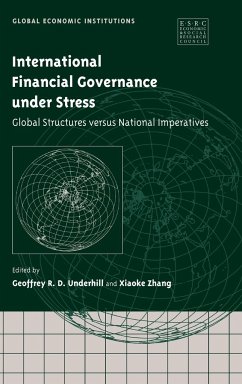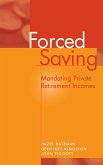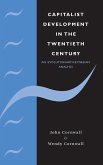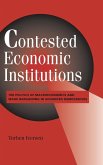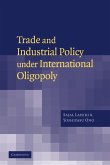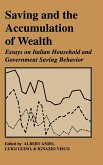Geoffrey R. D. Underhill / Xiaoke Zhang (eds.)
International Financial Governance under Stress
Herausgeber: Underhill, Geoffrey R. D.; Zhang Xiaoke
Geoffrey R. D. Underhill / Xiaoke Zhang (eds.)
International Financial Governance under Stress
Herausgeber: Underhill, Geoffrey R. D.; Zhang Xiaoke
- Gebundenes Buch
- Merkliste
- Auf die Merkliste
- Bewerten Bewerten
- Teilen
- Produkt teilen
- Produkterinnerung
- Produkterinnerung
A wide-ranging analysis of institutional reforms needed to cope with international financial crises.
Andere Kunden interessierten sich auch für
![Forced Saving Forced Saving]() Hazel BatemanForced Saving76,99 €
Hazel BatemanForced Saving76,99 €![Capitalist Development in the Twentieth Century Capitalist Development in the Twentieth Century]() John CornwallCapitalist Development in the Twentieth Century97,99 €
John CornwallCapitalist Development in the Twentieth Century97,99 €![Contested Economic Institutions Contested Economic Institutions]() Torben IversenContested Economic Institutions76,99 €
Torben IversenContested Economic Institutions76,99 €![Trade and Industrial Policy Under International Oligopoly Trade and Industrial Policy Under International Oligopoly]() Sajal LahiriTrade and Industrial Policy Under International Oligopoly37,99 €
Sajal LahiriTrade and Industrial Policy Under International Oligopoly37,99 €![Consumer Expectations Consumer Expectations]() Richard Thomas CurtinConsumer Expectations57,99 €
Richard Thomas CurtinConsumer Expectations57,99 €![Saving and the Accumulation of Wealth Saving and the Accumulation of Wealth]() Albert Ando / Luigi Guiso / Ignazio Visco (eds.)Saving and the Accumulation of Wealth133,99 €
Albert Ando / Luigi Guiso / Ignazio Visco (eds.)Saving and the Accumulation of Wealth133,99 €![Getting Rich Getting Rich]() Lisa A. KeisterGetting Rich40,99 €
Lisa A. KeisterGetting Rich40,99 €-
-
-
A wide-ranging analysis of institutional reforms needed to cope with international financial crises.
Hinweis: Dieser Artikel kann nur an eine deutsche Lieferadresse ausgeliefert werden.
Hinweis: Dieser Artikel kann nur an eine deutsche Lieferadresse ausgeliefert werden.
Produktdetails
- Produktdetails
- Verlag: Cambridge University Press
- Seitenzahl: 410
- Erscheinungstermin: 17. Mai 2016
- Englisch
- Abmessung: 235mm x 157mm x 27mm
- Gewicht: 742g
- ISBN-13: 9780521817325
- ISBN-10: 0521817323
- Artikelnr.: 35455423
- Herstellerkennzeichnung
- Libri GmbH
- Europaallee 1
- 36244 Bad Hersfeld
- gpsr@libri.de
- Verlag: Cambridge University Press
- Seitenzahl: 410
- Erscheinungstermin: 17. Mai 2016
- Englisch
- Abmessung: 235mm x 157mm x 27mm
- Gewicht: 742g
- ISBN-13: 9780521817325
- ISBN-10: 0521817323
- Artikelnr.: 35455423
- Herstellerkennzeichnung
- Libri GmbH
- Europaallee 1
- 36244 Bad Hersfeld
- gpsr@libri.de
GEOFFREY R. D. UNDERHILL is Professor of International Governance in the Department of Political Science of the University of Amsterdam.
XIAOKE ZHANG is Research Fellow in the Department of Political Science of the University of Amsterdam.
XIAOKE ZHANG is Research Fellow in the Department of Political Science of the University of Amsterdam.
List of figures; List of tables; List of contributors; Acknowledgements;
Introduction: global market integration, financial crises and policy
imperatives Geoffrey R. D. Underhill and Xiaoke Zhang; Part I. Financial
Globalisation and Policy Responses: Concepts and Arguments: 1. Reform of
the international financial architecture: what has been written? Jonathan
Story; 2. Costs and benefits of financial globalisation: concepts, evidence
and implications John Williamson; 3. Capital controls: the neglected option
Benjamin J. Cohen; 4. Global structures and political imperatives: in
search of normative underpinnings for international financial order
Geoffrey R. D. Underhill and Xiaoke Zhang; Part II. Globalisation,
Financial Crises and National Experiences: 5. Crisis consequences: lessons
from Thailand Pasuk Phongpaichit and Chris Baker; 6. The politics of
financial reform: recapitalising Indonesia's banks Richard Robison; 7.
South Korea and the Asian crisis: the impact of the democratic deficit and
OECD accession Stephen L. Harris; 8. Currency crises in Russia and other
transition economies Vladimir Popov; 9. Capital account convertibility and
the national interest: has India got it right? Vijay Joshi; 10. Learning to
live without the Plan: financial reform in China Shaun Breslin; 11. The
Asian financial crisis and Japanese policy reactions Masayuki Tadokoro;
Part III. Private Interests, Private-Public Interactions and Financial
Policy: 12. Private capture, policy failures and financial crisis: evidence
and lessons from South Korea and Thailand Xiaoke Zhang and Geoffrey R. D.
Underhill; 13. Governance, markets and power: the political economy of
accounting reform in Indonesia Andrew Rosser; 14. The private sector,
international standards and the architecture of global finance George Vojta
and Marc Uzan; Part IV. Building the New Financial Architecture: Norms,
Institutions and Governance: 15. The legitimacy of international
organisations and the future of global governance Jean-Marc Coicaud and
Luiz A. Pereira da Silva; 16. The G-7 and architecture debates: norms,
authority and global financial governance Andrew Baker; 17. Bail-outs,
bail-ins and bankruptcy: evolution of the new architecture Manmohan S.
Kumar and Marcus Miller; Conclusion: towards the good governance of the
international financial system Geoffrey R. D. Underhill and Xiaoke Zhang;
Index.
Introduction: global market integration, financial crises and policy
imperatives Geoffrey R. D. Underhill and Xiaoke Zhang; Part I. Financial
Globalisation and Policy Responses: Concepts and Arguments: 1. Reform of
the international financial architecture: what has been written? Jonathan
Story; 2. Costs and benefits of financial globalisation: concepts, evidence
and implications John Williamson; 3. Capital controls: the neglected option
Benjamin J. Cohen; 4. Global structures and political imperatives: in
search of normative underpinnings for international financial order
Geoffrey R. D. Underhill and Xiaoke Zhang; Part II. Globalisation,
Financial Crises and National Experiences: 5. Crisis consequences: lessons
from Thailand Pasuk Phongpaichit and Chris Baker; 6. The politics of
financial reform: recapitalising Indonesia's banks Richard Robison; 7.
South Korea and the Asian crisis: the impact of the democratic deficit and
OECD accession Stephen L. Harris; 8. Currency crises in Russia and other
transition economies Vladimir Popov; 9. Capital account convertibility and
the national interest: has India got it right? Vijay Joshi; 10. Learning to
live without the Plan: financial reform in China Shaun Breslin; 11. The
Asian financial crisis and Japanese policy reactions Masayuki Tadokoro;
Part III. Private Interests, Private-Public Interactions and Financial
Policy: 12. Private capture, policy failures and financial crisis: evidence
and lessons from South Korea and Thailand Xiaoke Zhang and Geoffrey R. D.
Underhill; 13. Governance, markets and power: the political economy of
accounting reform in Indonesia Andrew Rosser; 14. The private sector,
international standards and the architecture of global finance George Vojta
and Marc Uzan; Part IV. Building the New Financial Architecture: Norms,
Institutions and Governance: 15. The legitimacy of international
organisations and the future of global governance Jean-Marc Coicaud and
Luiz A. Pereira da Silva; 16. The G-7 and architecture debates: norms,
authority and global financial governance Andrew Baker; 17. Bail-outs,
bail-ins and bankruptcy: evolution of the new architecture Manmohan S.
Kumar and Marcus Miller; Conclusion: towards the good governance of the
international financial system Geoffrey R. D. Underhill and Xiaoke Zhang;
Index.
List of figures; List of tables; List of contributors; Acknowledgements;
Introduction: global market integration, financial crises and policy
imperatives Geoffrey R. D. Underhill and Xiaoke Zhang; Part I. Financial
Globalisation and Policy Responses: Concepts and Arguments: 1. Reform of
the international financial architecture: what has been written? Jonathan
Story; 2. Costs and benefits of financial globalisation: concepts, evidence
and implications John Williamson; 3. Capital controls: the neglected option
Benjamin J. Cohen; 4. Global structures and political imperatives: in
search of normative underpinnings for international financial order
Geoffrey R. D. Underhill and Xiaoke Zhang; Part II. Globalisation,
Financial Crises and National Experiences: 5. Crisis consequences: lessons
from Thailand Pasuk Phongpaichit and Chris Baker; 6. The politics of
financial reform: recapitalising Indonesia's banks Richard Robison; 7.
South Korea and the Asian crisis: the impact of the democratic deficit and
OECD accession Stephen L. Harris; 8. Currency crises in Russia and other
transition economies Vladimir Popov; 9. Capital account convertibility and
the national interest: has India got it right? Vijay Joshi; 10. Learning to
live without the Plan: financial reform in China Shaun Breslin; 11. The
Asian financial crisis and Japanese policy reactions Masayuki Tadokoro;
Part III. Private Interests, Private-Public Interactions and Financial
Policy: 12. Private capture, policy failures and financial crisis: evidence
and lessons from South Korea and Thailand Xiaoke Zhang and Geoffrey R. D.
Underhill; 13. Governance, markets and power: the political economy of
accounting reform in Indonesia Andrew Rosser; 14. The private sector,
international standards and the architecture of global finance George Vojta
and Marc Uzan; Part IV. Building the New Financial Architecture: Norms,
Institutions and Governance: 15. The legitimacy of international
organisations and the future of global governance Jean-Marc Coicaud and
Luiz A. Pereira da Silva; 16. The G-7 and architecture debates: norms,
authority and global financial governance Andrew Baker; 17. Bail-outs,
bail-ins and bankruptcy: evolution of the new architecture Manmohan S.
Kumar and Marcus Miller; Conclusion: towards the good governance of the
international financial system Geoffrey R. D. Underhill and Xiaoke Zhang;
Index.
Introduction: global market integration, financial crises and policy
imperatives Geoffrey R. D. Underhill and Xiaoke Zhang; Part I. Financial
Globalisation and Policy Responses: Concepts and Arguments: 1. Reform of
the international financial architecture: what has been written? Jonathan
Story; 2. Costs and benefits of financial globalisation: concepts, evidence
and implications John Williamson; 3. Capital controls: the neglected option
Benjamin J. Cohen; 4. Global structures and political imperatives: in
search of normative underpinnings for international financial order
Geoffrey R. D. Underhill and Xiaoke Zhang; Part II. Globalisation,
Financial Crises and National Experiences: 5. Crisis consequences: lessons
from Thailand Pasuk Phongpaichit and Chris Baker; 6. The politics of
financial reform: recapitalising Indonesia's banks Richard Robison; 7.
South Korea and the Asian crisis: the impact of the democratic deficit and
OECD accession Stephen L. Harris; 8. Currency crises in Russia and other
transition economies Vladimir Popov; 9. Capital account convertibility and
the national interest: has India got it right? Vijay Joshi; 10. Learning to
live without the Plan: financial reform in China Shaun Breslin; 11. The
Asian financial crisis and Japanese policy reactions Masayuki Tadokoro;
Part III. Private Interests, Private-Public Interactions and Financial
Policy: 12. Private capture, policy failures and financial crisis: evidence
and lessons from South Korea and Thailand Xiaoke Zhang and Geoffrey R. D.
Underhill; 13. Governance, markets and power: the political economy of
accounting reform in Indonesia Andrew Rosser; 14. The private sector,
international standards and the architecture of global finance George Vojta
and Marc Uzan; Part IV. Building the New Financial Architecture: Norms,
Institutions and Governance: 15. The legitimacy of international
organisations and the future of global governance Jean-Marc Coicaud and
Luiz A. Pereira da Silva; 16. The G-7 and architecture debates: norms,
authority and global financial governance Andrew Baker; 17. Bail-outs,
bail-ins and bankruptcy: evolution of the new architecture Manmohan S.
Kumar and Marcus Miller; Conclusion: towards the good governance of the
international financial system Geoffrey R. D. Underhill and Xiaoke Zhang;
Index.

